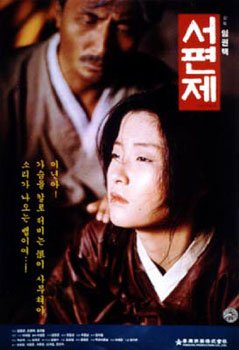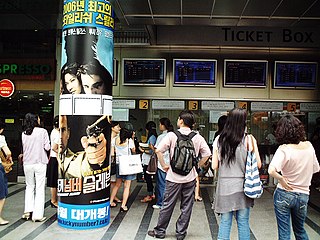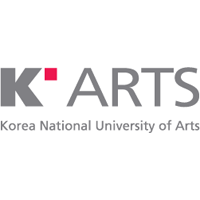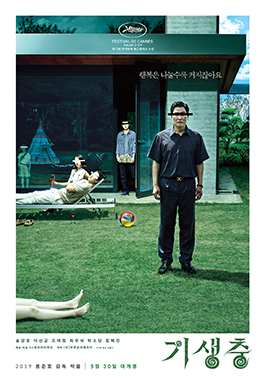| Lists of South Korean films by year |
|---|
 |
| Korean Animation |
A list of films produced in South Korea in 1993:
| Lists of South Korean films by year |
|---|
 |
| Korean Animation |
A list of films produced in South Korea in 1993:

Busan, officially Busan Metropolitan City, is South Korea's second most populous city after Seoul, with a population of over 3.4 million inhabitants as of 2017. Formerly romanized as Pusan, it is the economic, cultural and educational center of southeastern South Korea, with its port being South Korea's busiest and the sixth-busiest in the world. The surrounding "Southeastern Maritime Industrial Region" is South Korea's largest industrial area. The large volumes of port traffic and urban population in excess of 1 million make Busan a Large-Port metropolis using the Southampton System of Port-City classification.
The year 1993 in film involved many significant films, including the blockbuster hits Jurassic Park, The Fugitive, and The Firm.

Rough Draft Studios, Inc. is an American animation production studio based in Glendale, California, with a second studio in Glendale and its sister studio Rough Draft Korea located in Seoul, South Korea. The studio was founded in Van Nuys, Los Angeles by Gregg Vanzo in 1991.

The Korean Wave or Hallyu is a cultural phenomenon in which the global popularity of South Korean popular culture has dramatically risen since the 1990s. Worldwide interest in Korean culture has been led primarily by the spread of K-pop and K-dramas, with keystone successes including BTS and Psy's "Gangnam Style", as well as Jewel in the Palace, Winter Sonata, and Squid Game. The Korean Wave has been recognized as a form of soft power and as an important economic asset for South Korea, generating revenue through both exports and tourism.
Kang Woo-suk is a South Korean film producer and director. He has often been called the most powerful man in Korean cinema, topping Cine21 magazine's list of '50 Most Powerful Men in Korean Cinema' for seven consecutive years from 1998 to 2004.
Cinema Service (Korean: 시네마서비스) was a South Korean film production and distribution company.

Seopyeonje is a 1993 South Korean musical drama film directed by Im Kwon-taek, based on the eponymous novel by Yi Chong-jun. It is the first South Korean film to draw over one million audiences and has had significant influence in reviving popular interest in traditional Korean culture and pansori.
List of Korean films may refer to:
Jang Sun-woo is a South Korean film director.

Two Cops is a 1993 South Korean action comedy film directed by Kang Woo-suk. It stars Ahn Sung-ki and Park Joong-hoon as a pair of police detectives with different outlooks who end up working on a case together.

South Korean films have been heavily influenced by such events and forces as the Korea under Japanese rule, the Korean War, government censorship, the business sector, globalization, and the democratization of South Korea.
Bae, also spelled Bai or Pae, is a Korean family name. The South Korean census of 2015 found 400,641 people by this surname, or less than 1% of the population. In a study by the National Institute of the Korean Language based on 2007 application data for South Korean passports, it was found that 96.8% of people with this family name spelled it in Latin letters as Bae. Rarer alternative spellings included Bai, Pae, and Bea.

Jung is a Latin alphabet rendition of the Korean family name "정", also often spelled Jeong, Chung, Joung or Jong. As of the South Korean census of 2015, there were 2,407,601 people by this name in South Korea or 4.84% of the population. The Korean family name "정" is mainly derived from three homophonous hanja. 鄭 (2,151,879), 丁 (243,803) and 程 (11,683). The rest of the homophonous hanjas include: 政 (139), 桯 (41), 定 (29), 正 (22) and 情 (5).
This is a list of films by year produced in the country of South Korea which came into existence officially in September 1948. The lists of Korean films are divided by period for political reasons. For earlier films of united Korea see List of Korean films of 1919–1948. For the films of North Korea see List of North Korean films. For an A-Z list of films see Category:Korean films.

The South Korea women's national handball team is the national team of South Korea. Since 1984 the Korean team has not only participated constantly in Olympic Games but also ranked among the top four nations every time until 2012. Korea grabbed the gold medal in 1988 and 1992, won the silver medal in 1984, 1996, 2004 and took bronze medal in 2008. They have earned two World Championship medals so far: In 1995, they also won the World Championship title in Austria/Hungary 1995 World Women's Handball Championship, they came off third to secure the bronze medal at the Croatia in 2003 World Women's Handball Championship. It is a twelve time Asian Champion, the tournament has been won by any other nation only twice.

Korea National University of Arts is a national university in Seoul, South Korea. Korea National University of Arts was established in 1993 by the Ministry of Culture, Sports and Tourism of Korea as the only national university of arts with an aim to serve as a leading institution which cultivates artists. It has 26 departments in six schools: Schools of Music, Drama, Film, TV & Multimedia, Dance, Visual Arts, and Korean Traditional Arts.

Daegu Queer Culture Festival (DQCF) or Daegu Queer Festival is an annual modern Korean festival with the theme of LGBT rights. It includes a pride parade and film festival. The festival lasts for a week or two, and usually takes place in late June. The event has been held every year since 2009 and has faced opposition from religious groups. Opposition by religious groups has prohibited the Daegu Queer Culture Festival from being held on an outdoor stage on a popular street that is typically utilized for other festivities in Daegu. It is estimated that about 28 religious and right-wing groups have formed a "gay issue countermeasure committee" in Daegu to block the commencement of events that serve the LGBT community. These groups believe that article 11 of South Korea's constitution, which states that "discrimination in political, economic, social or cultural life on account of sex, religion or social status" does not apply to same-sex marriages. The organizer of the Korea Queer Culture Festival states that South Korea condones public homosexuality due to its conservative background. The older generations believe that homosexuality is a foreign phenomenon, which contributes to rejection and isolation of the homosexual and bisexual community.

Parasite is a 2019 South Korean black comedy thriller film directed by Bong Joon-ho, who co-wrote the screenplay with Han Jin-won and co-produced. The film, starring Song Kang-ho, Lee Sun-kyun, Cho Yeo-jeong, Choi Woo-shik, Park So-dam, Jang Hye-jin, Park Myung-hoon, and Lee Jung-eun, follows a poor family who infiltrate the life of a wealthy family.
The Zainichicinema refers to the transnational film industry of Japan, South and North Korea. With the main theme on the struggles or experiences faced by the resident Korean community or individuals in Japan, the Zainichi cinema is characterized by a wide range of film genres, which encompass melodramas to Yakuza films.